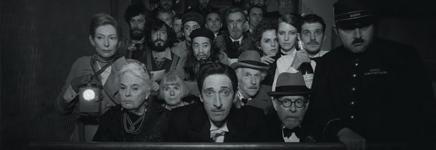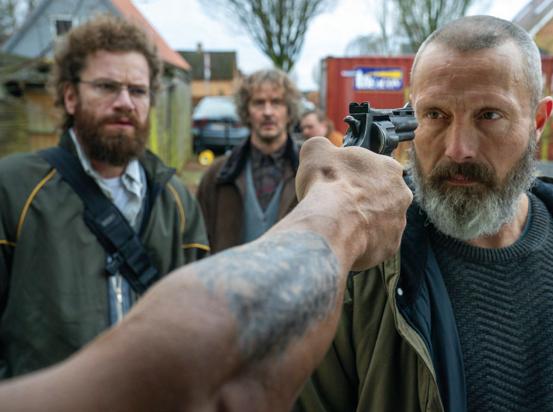
8 minute read
Our team’s picks of the Best Films of 2021 alongside our
Best Films of 2021
The history books will record 2021 as the year the movies bounced back from the brink, but the pandemic had little impact on the quality of work on our screens. Whether you saw these ten films in theatres or on your laptop, their artistry shone brightly
Advertisement
10. Shiva Baby (Emma Seligman) What happens when your sugar daddy, his wife and baby, your parents, your ex-girlfriend, and your overbearing relatives gather under one roof for a funeral service? Emma Seligman’s Shiva Baby dares to ask that question, and the result is a queasy firecracker of a film, stuffed with knife-sharp wit and claustrophobia. Move along, Uncut Gems. [Xuanlin Tham]
9. The French Dispatch (Wes Anderson) Consensus says this is Wes Anderson’s most Wes Andersonian film, and where one falls on it certainly depends on how much one likes him in the first place. It’s nice to know the writers at The Skinny still love Anderson’s compulsive architectural symmetry, striking emotional openness, and the shuddering dynamic between the two; The French Dispatch displays the director at his best. [Thomas Atkinson]
8. Summer of Soul (...Or, When the Revolution Could Not Be Televised) (Ahmir Khalib Thompson) Ahmir Khalib Thompson (AKA Questlove) has done the Lord’s work by unearthing footage from the 1969 Mount Morris Park Festival in Harlem. The archive is vibrant, overflowing with indelible performances – a hyperactive and fresh-faced Stevie Wonder, Sly and the Family Stone at their funkiest, Nina Simone in sun goddess mode – but it’s the way Thompson weaves the music with the history of African-American oppression and resilience that makes Summer of Soul truly sing. [Jamie Dunn]
7. Minari (Lee Isaac Chung) The tender Minari follows a Korean-American family who’ve moved to Arkansas, hoping to build a better life for themselves. The family’s high tensions are coupled with moments of humour and warmth, creating a true closeness, rare to see on film. In Minari, Lee Isaac Chung creates a story of love and resilience that moves through both its joy and pain. [Eilidh Akilade]
6. Drive My Car (Ryusuke Hamaguchi) Ryusuke Hamaguchi’s ingenious adaptation of Haruki Murakami’s short story is a piercing examination of grief and the mysteries of the heart. He uses long car rides and a production of Uncle Vanya to illuminate each character’s thoughts and emotions, and after three hours we feel we know them intimately. Drive My Car is as playful and intellectually stimulating as it is deeply moving, and the ensemble cast is perfect. [Philip Concannon]
5. The Green Knight (David Lowery) Arthuriana emerges from the ground in David Lowery’s vision. The rich moist earth, echoes and shadows of stone halls, and creaking, constantly regrowing vines comprising the court’s mysterious Christmas visitor dominate The Green Knight’s visual and aural palette. Lowery’s film moves with impartial, relentless deliberateness; watching Dev Patel’s Gawain spend his journey – unwisely, but well – proves a haunting picture of youth. [Carmen Paddock]









4. Titane (Julia Ducournau) Julia Ducournau’s stomach-turning horror takes the French Extremity to its most extreme, inspiring walkouts at its premiere at Cannes but deservedly winning director Julia Ducournau the coveted Palme d’Or. With its visceral imagery, Titane uses serial murder, vehicular intercourse and buddy comedy to illustrate the bodily terror of being a woman. Like a roaring engine, it pumps motor oil, fear and pure adrenaline through the veins. [Iana Murray]
3. First Cow (Kelly Reichardt) Kelly Reichardt’s First Cow might focus on the successful business venture of an American cook and a Chinese immigrant in 1820s Oregon, but it sits comfortably alongside her more contemporaneous studies of economic alienation. A loose adaptation of Jonathan Raymond’s novel The Half-Life, this offbeat exploration of friendship, capitalism and culinary ingenuity is a welcome recalibration of the American frontier myth. [Patrick Gamble]
2. Limbo (Ben Sharrock) The hostile environment takes on new and literal significance in this absurdist drama about a group of asylum seekers sent to a remote Scottish island for processing. This is filmmaking defined by breathtaking empathy: meticulously framing his characters in wide, grief-tinged landscapes, director Ben Sharrock locates tenderness in the most fraught of conditions, crafting a quiet yet unequivocal condemnation of the West’s response to the refugee crisis. [Anahit Behrooz]
1. Petite Maman (Céline Sciamma) A profoundly moving fable which above all invites the viewer to ask themselves a simple question: What would it be like to be an eight-year-old, meeting your mother when she too was eight years old? Told with an otherworldly simplicity by director Céline Sciamma, with gorgeous music by her frequent collaborator Para One and tender, intelligent performances from twin leads Josephine and Gabrielle Sanz, this is a transcendent experience. [Ian Mantgani]
Head to theskinny.co.uk/film to read our Film writers’ individual picks
Underrated Films of 2021
If you blinked this year you likely missed these misunderstood films when they played to empty auditoriums at your local theatres – if they made it to cinemas at all! Use the holidays to seek out these delightful cinematic oddballs and rejects
Barb and Star Go to Vista Del Mar (Josh Greenbaum) The Bridesmaids team is back with a bang in this kaleidoscopic, sublimely silly and criminally underrated comedy. Co-writers Kristen Wiig and Annie Mumolo are the titular culotte-loving, middle-aged besties on a Florida getaway, crossing the path of murderous villain Sharon Fisherman (also Wiig). But the real surprise is Jamie Dornan as Sharon’s henchman Edgar, who romances the two friends and gifts viewers a preposterous, delightful dance routine for the ages. [Stefania Sarrubba]

The Dog Who Wouldn’t Be Quiet (Ana Katz) A poetic homage to life and all of its woes and glories, Ana Katz's The Dog Who Wouldn’t Be Quiet is a poignant tale of a modern flaneur who is comfortable in peaceful passivity. Through its contemplative black and white cinematography and beautifully contained performances, this Argentinian gem communicates the most complex of emotions through unrequited gentleness. A triumph. [Rafaela Sales Ross]

Greenland (Ric Roman Waugh) Yes, the Amazon Prime/Gerard Butler movie is good. I am shook. You are shook. We are all shook. Greenland paints an uncomfortably realistic portrait of how a world responds to the first tremors of a global disaster. On top of that, it features some genuinely stunning effects and keeps its eyes firmly on the human drama underneath them, even when the sky is falling. [Ross McIndoe] I’m Your Man (Maria Schrader) The uncanny promises of AI get an imaginative, surprisingly funny reworking in Maria Schrader’s heartfelt rom-com. Dan Stevens delivers his best performance in years, his just-too-perfect face and bearing contributing to the oddness. But ultimately, observing and adapting to humans proves the oddest experience of all. I’m Your Man knows that frustrations enrich life, and those shouldn’t be automated. [Carmen Paddock]
The Last Duel (Ridley Scott) From The Duellists to The Last Duel, what a career Ridley Scott has had. And he’s never been kindly treated by the critics. His best films have been appreciated in retrospect (Blade Runner) or not at all (1492: Conquest of Paradise). I’m confident the roundly abused The Last Duel will join Scott’s list of underappreciated masterpieces. This medieval #MeToo tale is technically daring, brazenly witty (Ben Affleck is funny AF), and has a final 20 minutes of pure cinema. [John Bleasdale]
Malignant (James Wan) They don’t make movies like this anymore, primarily for good reason. James Wan’s completely unhinged response to Aquaman earning a billion dollars, this horror-mystery is as close as we’ve had to a studio financing an intentionally so-bad-it’s-good film. Best appreciated by those who value slick filmmaking craft and a penchant for off-thewall nonsense. Once it warms up, it never cools down. [Rory Doherty]
The Night House (David Bruckner) It’s easy enough to denounce The Night House as a meagre entrant into the pantheon of calcified, ‘elevated’ horror. But that misses the primally upsetting, sophisticated conceit running through this exhausting drama of grief and hopelessness. Naysayers will deplore it for treating trauma as a gimmick; I disagree. This is the most earnest, high-minded, elementally scary horror film in years. [Thomas Atkinson]
Barb and Star Go to Vista Del Mar
Ninjababy (Yngvild Sve Flikke) When Rakel discovers she’s pregnant after a one-night stand with a butter-scented man, she reckons on an abortion. To her shock, however, she’s seven months gone, and this inventive foetus takes to taunting her in doodle form. Ninjababy bracingly flips pregnancy narratives – Rakel is resolutely not maternal. Grappling with her predicament frankly, this film draws its coming-of-age story with distinctive lines. [Eleanor Capaldi]
Palm Springs (Max Barbakow) Acclaimed by the few who saw it at US drive-thrus in 2020 and a UK streaming audience this year, Palm Springs deserved so much more: specifically, packed cinemas across the world, full of laughter. Why? Because Max Barbakow’s time-loop comedy about a schmuck stuck at a wedding (Andy Samberg) in the titular dessert resort town is relentlessly funny, loveable and ridiculous. [Lou Thomas]
Riders of Justice (Anders Thomas Jensen) While Another Round was receiving critical plaudits and awards, there was another Mads Mikkelsen-starring Zentropa production in cinemas that deserved more acclaim. It’s a violent and morally ambiguous revenge tale, but one shot through with a streak of knockabout comedy. Anders Thomas Jensen handles the wildly fluctuating tone superbly. As hilarious as Riders of Justice frequently is, he never loses sight of his characters’ grief and trauma. [Philip Concannon]
For The Skinny’s Film Team’s full list of underrated film of 2021, head to theskinny.co.uk/film










